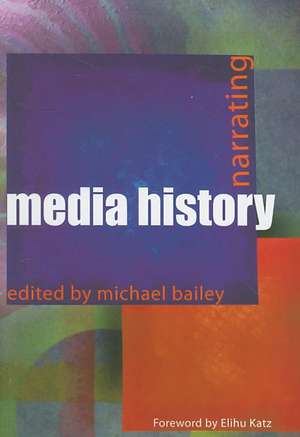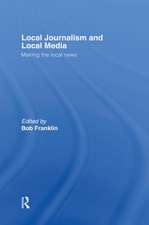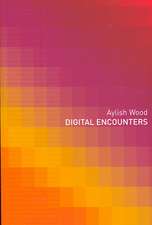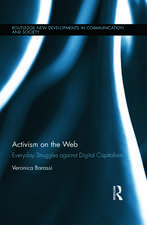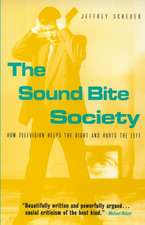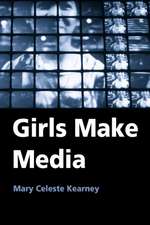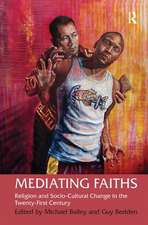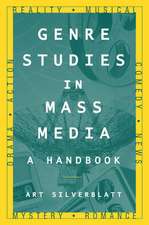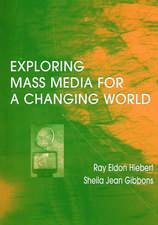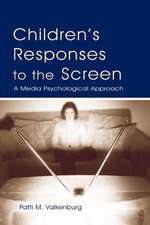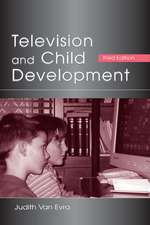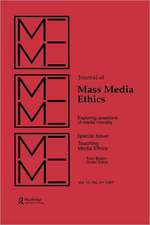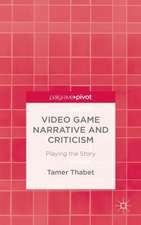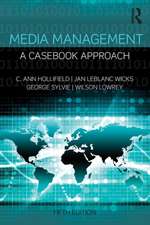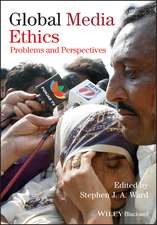Narrating Media History: Communication and Society
Editat de Michael Baileyen Limba Engleză Paperback – 20 aug 2008
This unique and timely collection brings together leading international media history scholars, not only to identify and contrast the various interrelationships between media histories, but also to encourage dialogue between different historical, political, and theoretical perspectives including:
liberalism, feminism, populism, nationalism, libertarianism, radicalism and technological determinism.
Essays by distinguished academics cover television, radio, newspaper press and advertising (among others) and illustrate the particularities, affinities, strengths and weaknesses within media history. Each section includes a brief introduction by the editor, with discussion topics and suggestions for further reading, making this an invaluable guide for students of media history.
| Toate formatele și edițiile | Preț | Express |
|---|---|---|
| Paperback (1) | 241.16 lei 6-8 săpt. | |
| Taylor & Francis – 20 aug 2008 | 241.16 lei 6-8 săpt. | |
| Hardback (1) | 1005.04 lei 6-8 săpt. | |
| Taylor & Francis – 20 aug 2008 | 1005.04 lei 6-8 săpt. |
Din seria Communication and Society
-
 Preț: 231.41 lei
Preț: 231.41 lei -
 Preț: 188.18 lei
Preț: 188.18 lei -
 Preț: 274.60 lei
Preț: 274.60 lei -
 Preț: 279.88 lei
Preț: 279.88 lei -
 Preț: 280.51 lei
Preț: 280.51 lei -
 Preț: 353.35 lei
Preț: 353.35 lei -
 Preț: 351.73 lei
Preț: 351.73 lei - 26%
 Preț: 765.43 lei
Preț: 765.43 lei -
 Preț: 348.88 lei
Preț: 348.88 lei - 18%
 Preț: 1000.27 lei
Preț: 1000.27 lei - 34%
 Preț: 794.55 lei
Preț: 794.55 lei - 18%
 Preț: 1000.27 lei
Preț: 1000.27 lei -
 Preț: 238.77 lei
Preț: 238.77 lei -
 Preț: 349.47 lei
Preț: 349.47 lei - 18%
 Preț: 1106.05 lei
Preț: 1106.05 lei - 34%
 Preț: 841.32 lei
Preț: 841.32 lei - 26%
 Preț: 765.23 lei
Preț: 765.23 lei - 18%
 Preț: 1011.64 lei
Preț: 1011.64 lei -
 Preț: 352.37 lei
Preț: 352.37 lei - 19%
 Preț: 493.12 lei
Preț: 493.12 lei - 18%
 Preț: 1001.84 lei
Preț: 1001.84 lei -
 Preț: 358.69 lei
Preț: 358.69 lei - 12%
 Preț: 112.02 lei
Preț: 112.02 lei - 18%
 Preț: 1002.63 lei
Preț: 1002.63 lei - 18%
 Preț: 1004.24 lei
Preț: 1004.24 lei -
 Preț: 354.78 lei
Preț: 354.78 lei - 18%
 Preț: 1003.99 lei
Preț: 1003.99 lei - 23%
 Preț: 698.27 lei
Preț: 698.27 lei -
 Preț: 352.33 lei
Preț: 352.33 lei - 34%
 Preț: 500.69 lei
Preț: 500.69 lei - 9%
 Preț: 121.75 lei
Preț: 121.75 lei -
 Preț: 352.33 lei
Preț: 352.33 lei -
 Preț: 395.93 lei
Preț: 395.93 lei - 30%
 Preț: 597.18 lei
Preț: 597.18 lei - 13%
 Preț: 94.12 lei
Preț: 94.12 lei - 26%
 Preț: 766.12 lei
Preț: 766.12 lei - 22%
 Preț: 521.44 lei
Preț: 521.44 lei - 18%
 Preț: 1003.93 lei
Preț: 1003.93 lei - 24%
 Preț: 165.77 lei
Preț: 165.77 lei -
 Preț: 347.72 lei
Preț: 347.72 lei - 27%
 Preț: 242.31 lei
Preț: 242.31 lei
Preț: 241.16 lei
Preț vechi: 332.16 lei
-27% Nou
Puncte Express: 362
Preț estimativ în valută:
46.14€ • 48.35$ • 38.15£
46.14€ • 48.35$ • 38.15£
Carte tipărită la comandă
Livrare economică 11-25 aprilie
Preluare comenzi: 021 569.72.76
Specificații
ISBN-13: 9780415419161
ISBN-10: 0415419166
Pagini: 304
Ilustrații: 1 table
Dimensiuni: 156 x 234 x 20 mm
Greutate: 0.45 kg
Ediția:1
Editura: Taylor & Francis
Colecția Routledge
Seria Communication and Society
Locul publicării:Oxford, United Kingdom
ISBN-10: 0415419166
Pagini: 304
Ilustrații: 1 table
Dimensiuni: 156 x 234 x 20 mm
Greutate: 0.45 kg
Ediția:1
Editura: Taylor & Francis
Colecția Routledge
Seria Communication and Society
Locul publicării:Oxford, United Kingdom
Public țintă
Postgraduate and UndergraduateCuprins
List of Figures and Tables Acknowledgements Notes on Contributors Foreword Elihu Katz Editor’s Introduction Michael Bailey 1. Narratives of Media History Revisited James Curran Section I: The Liberal Narrative 2. Renewing the Liberal Tradition: the Press and Public Discussion in Twentieth-Century Britain Mark Hampton 3. Change and Reaction in BBC Current Affairs Radio, 1928 – 1970 Hugh Chignell Section II: The Feminist Narrative 4. The Angel in the Ether: Early Radio and the Constitution of the Household Michael Bailey 5. ‘Going to Spain with the Boys’: Women Correspondents and the Spanish Civil War David Deacon Section III: The Populist Narrative 6. ‘A Moment of Triumph in the History of the Free Mind’? British and American Advertising Agencies’ Responses to the Introduction of Commercial Television in the United Kingdom Stefan Schwarzkopf 7. The Pilkington Report: the Triumph of Paternalism? Jeffrey Milland Section IV: The Libertarian Narrative 8. ‘A Stream of Pollution Through Every Part of the Country?’ Morality, Regulation and the Modern Popular Press Adrian Bingham 9. ‘Outrageously Bad Taste’: The BBC and the Controversy over This is Your Life in the 1950s Su Holmes Section V: The Anthropological Narrative 10. Television in Wales, c.1950-1970 Jamie Medhurst 11. ‘Nation Shall Speak Peace Unto Nation:’ The BBC and the Projection of a New Britain, 1967-1982 Daniel Day Section VI: The Radical Narrative 12. The Birth of Distance: Communications and Changing Conceptions of Elsewhere Graham Murdock and Michael Pickering 13. What Fourth Estate? Julian Petley Section VII: The Technological Determinist Narrative 14. The Question of Technology Paddy Scannell 15. Narrating the History of Media Technologies: Pitfalls and Prospects Menahem Blondheim Bibliography Index
Notă biografică
Michael Bailey teaches media history and cultural theory at Leeds Metropolitan University.
Descriere
Based on the work of media historian, James Curran, Narrating Media History explores British media history as a series of competing narratives.
This unique and timely collection brings together leading international media history scholars, not only to identify and contrast the various interrelationships between media histories, but also to encourage dialogue between different historical, political, and theoretical perspectives.
This unique and timely collection brings together leading international media history scholars, not only to identify and contrast the various interrelationships between media histories, but also to encourage dialogue between different historical, political, and theoretical perspectives.
